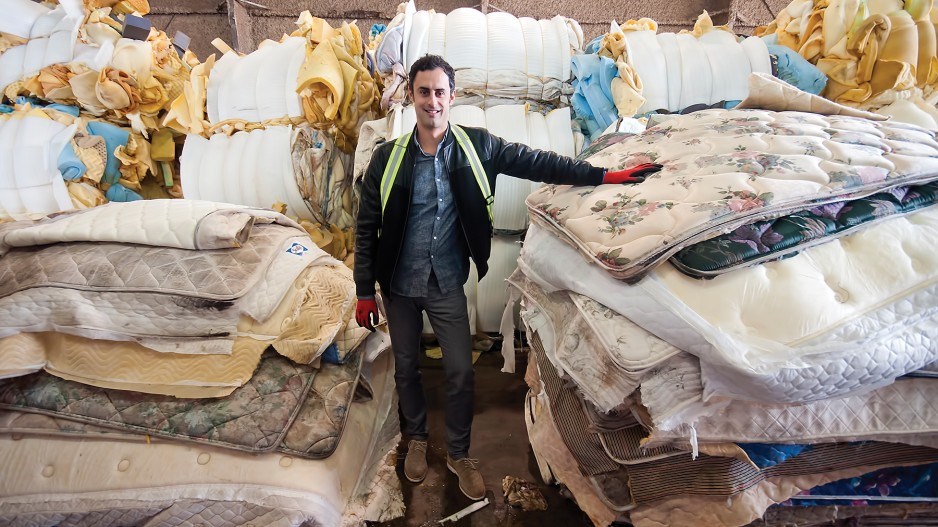The green economy is alive and well on Mitchell Island, thanks in part to Fabio Scaldaferri.
The entrepreneurial environmentalist is the CEO and cofounder of Mattress Recycling, a business that has grown significantly since it started in 2008.
The inspiration for the enterprise was sparked by a news story about mattress recycling in eastern Canada.
“I had never thought of it before,” said Scaldaferri, “and there seemed to be a lot of possibilities in recycling the content in a mattress. So I just started running numbers. I got really excited, because I’m an environmentalist at heart.”
Where others saw old furniture, Scaldaferri saw opportunity.
Mattresses are large, heavy and full of reusable material. Before Scaldaferri’s business began operations, many were ending up in Vancouver’s landfills, where they can damage landfill equipment. Others wound up dumped in alleys, side streets or wooded areas.
Used mattresses and box springs generate two revenue streams for Scaldaferri’s company: used furniture pick-up fees and sales of mattress components (wood, steel and foam) that are used in other products. It also salvages the quilting material from mattress tops as long as they are free of bedbugs and other contaminants.
Mattress Recycling sells the recovered foam and cloth in 1,000-pound bails to companies in Alberta and Washington state for carpet underlay. The salvaged wood is sold to the pulp and paper sector, and mattress cotton is reused locally in the upholstery market.
But Scaldaferri said that starting an industrial business in Vancouver was extremely challenging. Because the province’s industrial base is relatively small compared with other jurisdictions, it’s difficult for manufacturers and other industrial businesses to find equipment, employees and industrial land.
“I think there’s a bit of a blind spot in the West. We don’t seem to have what it takes and what industry needs here. It’s pretty concerning. It basically just boils down to a lack of investment, and it’s very frustrating for a business owner in a growing, green business.”
However, after Metro Vancouver banned mattresses and box springs from the region’s landfills at the start of 2011 and imposed a $15 mattress and box spring recycling fee, Scaldaferri’s business jumped 3,900% over the next five years: to 120,000 from 3,000 mattresses recycled annually.
While mattresses can no longer be discarded in landfills, they can still be taken to municipal dumps, where they’re stockpiled for recycling. The $15 fee helps cover the recycling cost.
“Every time we as a society ban a material from landfills, not only are we saving the resources and reusing them, but we’re also creating many jobs,” Scaldaferri said. “Just in my small business, we’re employing 50 people and, to be honest, we’re struggling to keep up with demand.”
Delta’s Canadian Mattress Recycling, a Mattress Recycling competitor, has also grown significantly over the past year.
The two companies are currently the Lower Mainland’s only major furniture recyclers.
But restrictive landfill bylaws have created another problem.
According to Joey Da Costa, owner of Joey’s Junk Removal, while the City of Vancouver has instituted fines for illegal dumping, it doesn’t have the capacity to effectively enforce its bylaw. Vancouver also does not have large item pickup programs like Richmond, Surrey.
“It’s not like they have surveillance in alley ways,” said De Costa. “You normally see most of the dumping in residential areas that have dumpsters, and once one person dumps a piece of furniture, others feel it’s OK to do the same.”
California, with a population larger than Canada’s, recently enacted its first extended producer responsibility recycling program, which also prohibits mattresses from being discarded in landfills. Scaldaferri said the state’s government consulted with Mattress Recycling when it was drafting the regulations.
Mattress Recycling plans to expand its business by collecting more mattresses from a larger geographic area and recycling couches and other large furniture items.




